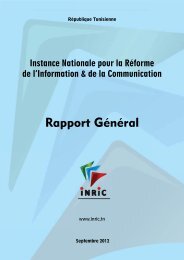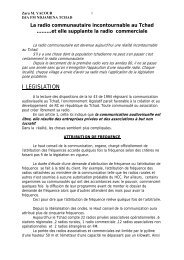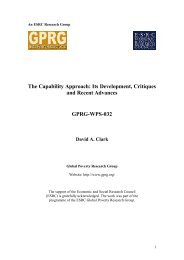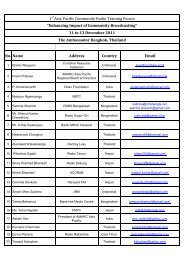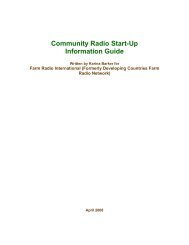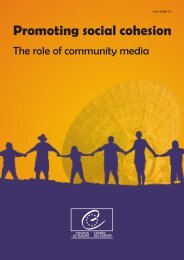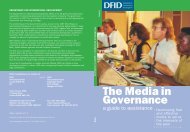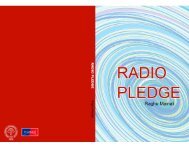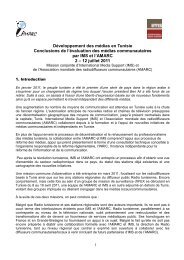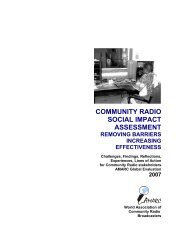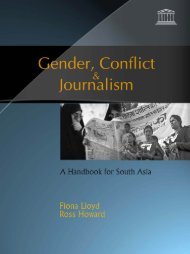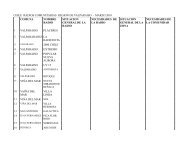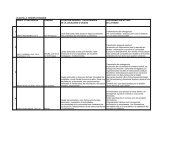Women's Empowerment and Good Governance Through - amarc
Women's Empowerment and Good Governance Through - amarc
Women's Empowerment and Good Governance Through - amarc
You also want an ePaper? Increase the reach of your titles
YUMPU automatically turns print PDFs into web optimized ePapers that Google loves.
Best Experiences for an Action Research Process 54<br />
Currently, at the national level, only 21 out of the 230-member legislature are women, while<br />
in a Cabinet of 19, only three of the ministers are women. Furthermore, there are only three<br />
women in the 24-member Council State, the constitutional body that advises the President<br />
of the Republic. It is worth noting that these three are among the 14 members of the council<br />
who were appointed by the president. An electoral college representing the 10 regions of the<br />
country elects the remaining 10 members.<br />
The situation is no different at the local government level, which is the lowest level of decision<br />
making <strong>and</strong> is seen to be closer to the ordinary person. There are only three women<br />
Presiding Members in the 128 rural District Assemblies in the country. Out of the 138 District<br />
Chief Executives, only 12 are women. Although the percentage of women who contested the<br />
election increased substantially during the 2006 district-level elections, Ghana’s Institute of<br />
Local Government Studies says only 11 per cent of the members of the district, municipal <strong>and</strong><br />
metropolitan assemblies are women.<br />
Besides the poor educational level <strong>and</strong> other factors mentioned earlier, it is believed that the<br />
low level of women’s participation in governance at both the national <strong>and</strong> local levels has been<br />
largely due to the perception that politics is dirty <strong>and</strong> better left to men, <strong>and</strong> because the dem<strong>and</strong>s<br />
of the traditional roles of the woman as a mother <strong>and</strong> wife. Most husb<strong>and</strong>s are widely<br />
known to be unsupportive of their wives’ political ambitions.<br />
Women in the media in Ghana<br />
In 2006, a survey was conducted by Women Media <strong>and</strong> Change, an Accra-based NGO, on the<br />
extent to which gender is incorporated into the work of eight selected media houses operating<br />
in the country. The houses include the public broadcaster, Ghana Broadcasting Corporation,<br />
the two public owned print media, two privately owned electronic <strong>and</strong> one print media, the Media<br />
Foundation for West Africa <strong>and</strong> the Ghana Journalists Association, which is the umbrella<br />
body of media practitioners in the country. The survey indicated that all eight organizations<br />
view gender as an integral part of development <strong>and</strong> freedom of expression <strong>and</strong> support the<br />
need for equal opportunities for both women <strong>and</strong> men. However, all the organizations reflect<br />
greater representation of men at all levels of their structure. Seven out of 10 people in the the<br />
organizations could not give any examples of any gender-specific work they have done while<br />
most of them did not consider gender as an issue that should form part of their organizational



